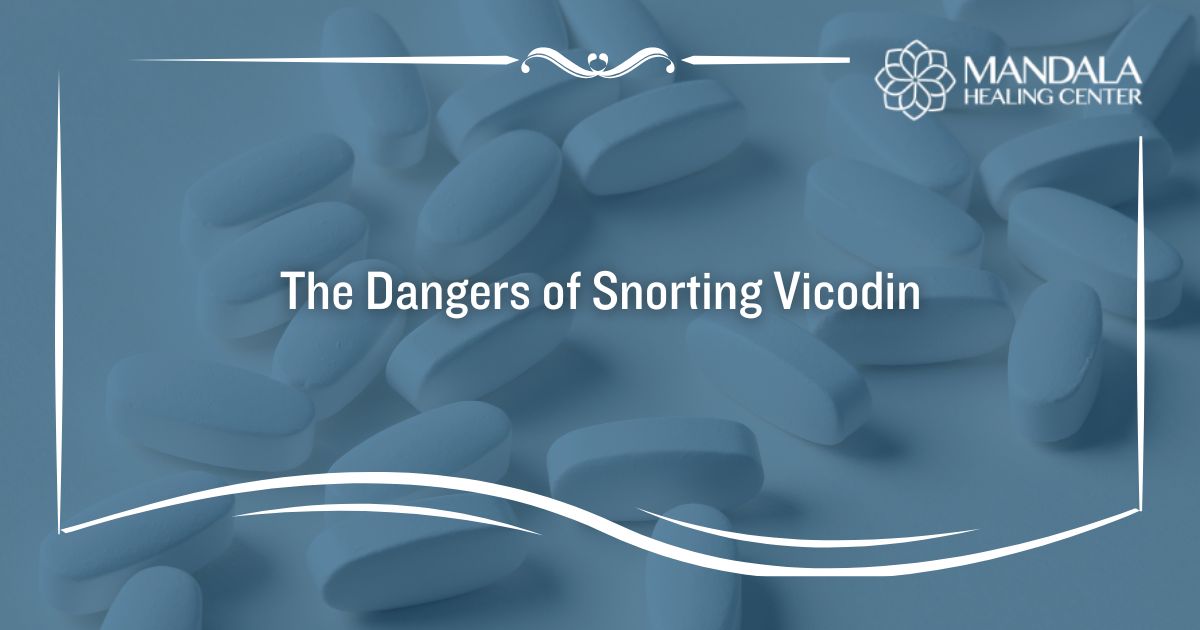Opioid abuse is a common issue in the United States. Unfortunately, when you suffer from opioid addiction, you are at an increased risk of experiencing an overdose. According to the National Institute on Drug Abuse (NIDA), 81,806 people died from an opioid overdose in 2022.[1]
There are a variety of opioids out there, with each one causing similar symptoms and mind-altering effects. A common opioid of abuse is known as Vicodin. Vicodin is the brand name for an opioid referred to as hydrocodone.
If you or a loved one abuse Vicodin, you probably know that there are many methods of administration. You can either swallow the pill, snort it, or inject it intravenously. While people believe that IV Vicodin abuse is the most dangerous, snorting the drug comes with its host of risks and dangers.
Some of the dangers of snorting hydrocodone include nasal problems, throat and lung damage, contracting blood-borne diseases, and life-threatening overdoses.
In this article, you will learn:
- Can you snort hydrocodone?
- What are the risks of snorting Vicodin?
- What are the signs and symptoms of hydrocodone overdose?
Can You Snort Vicodin?
It is possible to snort Vicodin. To snort the drug, you’d have to crush the pill into a fine powder and use a straw or dollar bill while inhaling the powder into your nose.
The side effects of snorting hydrocodone might include:[2]
- A rush of euphoria
- Dizziness and drowsiness
- Nausea and vomiting
- Dry mouth
- Stomach pain
- Headaches
- Increased sweating
- Slowed breathing and heart rate
- Itchy skin
- Small, pinpointed pupils
When you snort Vicodin, it enters your bloodstream immediately. As a result, you will experience a high almost instantaneously. This also increases your chances of developing an addiction.
Once you are addicted to snorting hydrocodone, you are at risk of experiencing health risks like nasal damage, throat and lung issues, blood-borne diseases from sharing straws or dollar bills, and life-threatening overdoses.
What are the Dangers of Snorting Hydrocodone?
Medications like Vicodin are intended to be released into your body over time. For example, when you swallow a hydrocodone pill, it travels through your digestive system before it enters your bloodstream, which means it takes longer to begin causing effects. When you snort Vicodin, it is absorbed into the mucous membranes in your nasal tissues, throat, and the roof of the mouth, allowing it to enter your bloodstream immediately.
Snorting the drug causes the effects to enter your bloodstream instantly, so the high will be more potent. It is also easier to experience an overdose.
The main risks associated with snorting hydrocodone include:
Nasal Damage
Your nasal passages have thin and delicate tissue. When you are snorting hard pieces of a pill, the abrasiveness can lead to damage.
Examples of the damage snorting hydrocodone can cause to your nasal passages include:
- Nasal crusting
- Cuts and infections in the nasal passage
- Facial swelling and pain
- Frequent nose bleeds
- Constant runny nose
- Perforation of the septum after long-term insufflation
Throat and Lung Issues
Long-term snorting can also lead to throat and lung issues. You could develop infections in your throat or experience hoarseness from the irritation.
Snorting Vicodin causes the drug to travel from your nose into your lungs, so you could also experience lung inflammation, asthma, and other lung conditions. A study found that snorting Vicodin leads to hypersensitivity pneumonitis, a condition that occurs when your immune system is affected by inhaled substances.[3]
Blood-Borne Diseases
If you are sharing the straws or dollar bills you use to snort Vicodin, that means you are potentially coming into contact with other people’s blood. Snorting can lead to cuts in the nasal passages and nosebleeds, and sharing tools with other people could increase the risk of developing a blood-borne disease like hepatitis or HIV.[4]
Overdose
Lastly, snorting Vicodin can lead to life-threatening overdoses. If the dose is too high for your body to handle, you could experience potentially fatal side effects.
The signs and symptoms of an opioid or Vicodin overdose include:[5]
- Loss of consciousness and unresponsiveness
- Limpness of the body
- Slowed or stopped breathing
- Decreased heart rate
- Small, pinpointed pupils
- Choking or gurgling noises
- Blue tint to lips and fingernails
- Coma
If you believe someone is overdosing on Vicodin, you should contact 911 immediately. As an opioid, hydrocodone overdoses can be reversed with a medication known as Narcan. That said, even if Narcan reverses the overdose, the individual will still need emergency medical treatment to fully stabilize.
Find Help for Hydrocodone Abuse and Addiction
While Vicodin can be used for pain relief, it is also an addictive substance. If you or a loved one suffers from hydrocodone addiction, it’s time to seek help from a professional treatment program. At the Mandala Healing Center, we offer a variety of treatment options, including specialized services like detox and medication-assisted treatment.
We can help you regain control over your life and learn how to maintain long-term sobriety. Contact us today for more information on our Vicodin addiction treatment center.
References:
- The National Institute on Drug Abuse (NIDA): Drug Overdose Deaths
- Medline Plus: Hydrocodone
- Taylor and Francis Online: Hydrocodone Snorting Leading to Hypersensitivity Pneumonitis
- Wolters Kluwer: Sharing of Snorting Straws and Hepatitis C Virus Infection in Pregnant Women
- The U.S. Department of Veterans Affairs (VA): Harm Reduction for Veterans With Substance Use Disorder
















